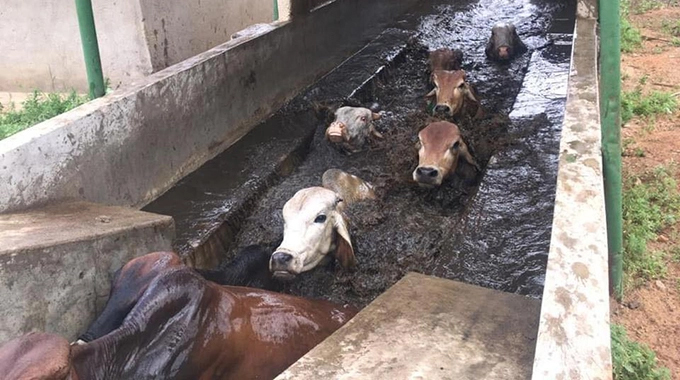
The ManicaPost

Samuel Kadungure
Senior Reporter
THE Department of Veterinary Services (DVS) has taken a tough stance to promote weekly cattle dipping in an informed bid to keep the province safe and clean by controlling the spread of tick borne diseases (TBD) — in which at least 4 500 cases were recorded last year.
Four notorious tick borne diseases (TBD) — babesiosis, anaplasmosis, theileriosis and heartwater — cause 65 percent of cattle diseases, leading to mortalities in the province.
Manicaland Provincial Veterinary Officer, Dr Charles Guri said this part of the year is the most difficult for livestock as the incessant rains, though welcome, increase tick infestations.
Dr Guri said this is the reason why Government has put in place a mechanism where the dipping cycle changes from once in two weeks during winter to weekly during the rainy season to break the cycle.
From January 2023 to date, the DVS recorded 4 500 cases of TBDs, amid indications that the majority of the cases were not being reported for unknown reasons.
Dr Guri said from January 2024 to April, they will adopt a more radical approach in a bid to contain the disease prevalence.
The tough stance coincided with the onset of the 2023/24 rainy season, and every farmer is duty-bound to dip their cattle every week.
January Disease, which is caused by irregular dipping, has been singled out to be the biggest problem in communal areas, wreaking havoc even outside the usual peak rainy season.
Communal areas in the province have about 650 000 cattle which are served by 542 communal dip tanks of various carrying capacities.
Severe shortages of dipping chemicals over the past years resulted in serious disruptions to the communal dipping programme, with cattle going for more than two months without dipping, consequently increasing the prevalence of tick-borne diseases.
The sad development prompted swift intervention by Government to resuscitate communal dipping, avail chemicals and ensure that cattle are dipped weekly during the wet season to prevent this and other diseases.
Manicaland has been certified as a safe and clean region following the successful implementation of a wider spectrum of radical measures to control the spread of the disease, a slate that the DVS is keen to maintain going forward.
The DVS will also enlist the services of traditional leaders and police to compel farmers to dip their cattle weekly.
Dr Guri said their approach seeks to eradicate complacency that has crept in farmers, especially those who refuse to avail their cattle for dipping, a practice that is punishable at law.
He said the provisions of the Animal Health Act will be used to criminalise deviant behaviour regarding dipping.
“Our dipping calendar has been adjusted according to these conditions and the frequency of dipping has increased to once a week because we want to reduce the infestation of animals by ticks. If the encounter of livestock and ticks is high, chances of animals contracting infections are high. We have changed from once fortnightly to once weekly dipping because we are coming from the dry season where the grass was dry with no rain activity, which means the activity of ticks and insects was low, and transmission of diseases was also low compared to the wet season where we have a combination of intense rain and high temperatures that gives an increased activity of ticks and insects,” he said.
Dr Guri said ticks and flies transmit protozoa parasites, bacterial and viral disease-causing agents into animals.
“During the wet season, tick borne diseases to guard against include the January Disease which has wreaked havoc in the farming communities, babesiosis, anaplasmosis, and heartwater which are the major cause of cattle mortalities in the province.
“About 65 percent of diseases that affect cattle are TBD, and if we follow the new calendar, it means we can be able to reduce chances of cattle falling sick by 65 percent. Dipping is a very important activity that we must carry, and we will prosecute those who violate the provisions of Animal Health Act by not availing their cattle for dipping,” he said.
Livestock expert, Professor Joseph Kamuzhanje said farmers should report any signs of disease no matter how small.
“It is better to contain a situation when it is small than when it has grown out of hand. Any sign of any disease outbreak should be communicated to the authorities. The rains are welcome because they will improve grazing, which is a respite for the livestock.
“Farmers must practice deworming and dosing so that their animals can regain their strength. The grazing that is coming up should be very nutritious, but if the animals are heavily infested with worms, it will not help them. We hope the rains will continue because we have some farmers who are into fodder cropping which should reach maturity,” he said.
Professor Kamuzhanje encouraged livestock farmers to use portions of their fields to grow some fodder in preparation for the 2024 dry page period.
“This is the period to start preparing for the next dry page during which period animal need to be well fed.
“The other thing is for farmers in areas that are not raining and where grazing pastures will not going to be at a premium to consider destocking.
“They can sell some animals and restock when the situation improves. We have a situation whereby our farmers are not very keen on that for very good reasons, but at the end of the day they are the ones who lose when the cattle die from poverty deaths,” he said.
At least 300 cattle died of poverty deaths in 2023.



